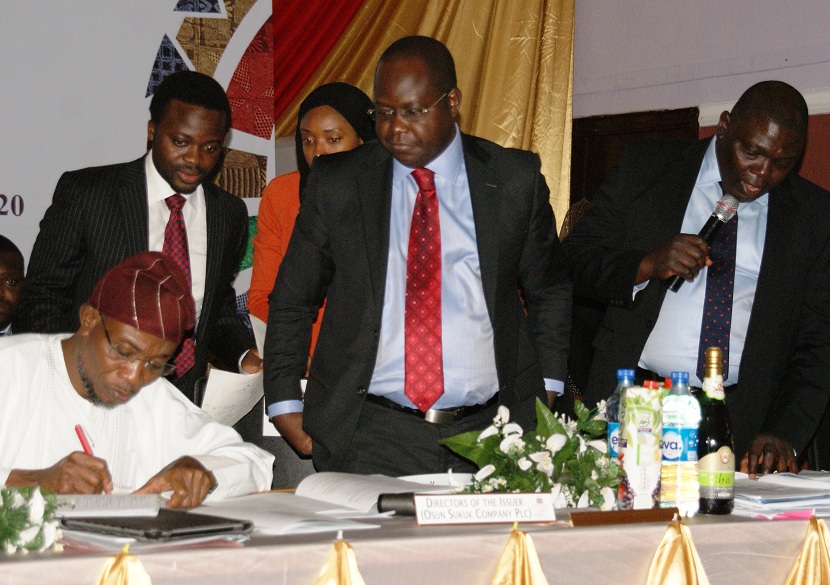
FINANCE: 'The Sukuk Is A Fund Regulated In The Strictest Terms By SEC.' – Bolorunduro

The approval recently granted by the Nigerian Security and Exchange Commission (NSEC) to Osun State Government to access N10billion Islamic Investment Bond called “Sukuk” has generated another heated controversy, especially among the Christian Organisations and opposition political party in the state. This bond is the first of its kind to be granted to any individual or organization and government in the entire West Africa region. Osun State Commissioner for Finance, Budget and Economic Planning, Dr. Wale Bolorunduro, in this Interview he cleared the air on status of the loan, the state debt profile and other issues. Excerpts:
Why has the state continued on a policy of uncontrolled borrowing to finance developmental projects?
All governments borrow, and they must. This is because the type of responsibilities a government shoulders are things that cannot wait and things which need far more money than the government realizes within the given space of time. Borrowing however must be controlled, for anything without control is a means of mindless destruction. But as far as a state within Nigeria is concerned, borrowing is strictly regulated by the Central Bank of Nigeria (CBN) as well as the Federal Ministry of Finance.The level of borrowing permitted to a state is relative to its monthly federal allocation, its Internally Generated Revenue (IGR), the size of its existing debt portfolio among other indicators of financial health.
Government borrowing is premised on the time-tested model that if credit is sourced to finance the right things like infrastructures and development of human capital, the environment is being fertilized for productivity. Once such productivity is well nurtured, it matures into a stable economy with negligible unemployment and a robust base for revenue generation through taxes. This will in turn lead to a painless liquidation of existing indebtedness. Borrowing therefore is not the problem but the purposes of the loan. There are other details of the structure of the loan, its rate, term and moratorium etc.
What is the guarantee that the borrowing will not serve as unending burden to the generation unborn?
I can assure you that the approach of the state government of Osun under Governor Rauf Aregbesola to borrowing has followed a very carefully calibrated professional order. We have remained mindful of all of our moral obligations to society as well as the public perception of our actions. We have taken the pains not to borrow on conditions that will hurt the state both now and in the future. In fact, all our borrowings are framed to make things easier for the future generations as I will shortly demonstrate. You will recall that at the inception of this administration it met an N18billion term loan that threatened to asphyxiate the state. The structure of the loan meant an across-the-counter interest rate in the range of N650million a month. At that time, the state’s IGR was about N300million and monthly allocation from the Centre stood at about N2.5billion: all this for a state with a salary bill of N2billion.
When you do the arithmetic, it becomes clear that a loan of this nature will kill the state slowly. To add, the loan was to develop six stadiums across the state. Stadiums will not add economic value except you are hosting the Olympics and the like. This was a strong and enough trouble for us that we had to source a fresh credit line with favorable terms to liquidate that N18billion debt as quickly as we can. The difference in the interest rates and other terms of the credit line meant a lot of savings for the state. The N30billion we raised from the capital market with terms far more public-friendly than the commercial bank short-term loan that was originally taken by the previous administration. All details of the bond are transparent information in public domain as records kept by the Securities and Exchange Commission, SEC.
Another reason why government borrows is to hedge against inflation. A road project costing N15 billion today will cost N20 in the next two years. It only makes sense to hedge against such trends so long as the interest rate on the loan is below the calculated inflation rate.
Why must Osun be the first state in Nigeria to draw an Islamic bond which will only enslave us to some Islamic investors, whether individuals or corporate?
We are not signing any agreement with any Islamic personality or Islamic organization, be it local or foreign. We are not enslaving the state in any way through the issuance of this bond. Sukuk is like any other conventional bond with the only difference being its attraction of additional investors who will not support interest borrowing and vanity projects. Investors are welcome as a matter of open business without reference to their religious background. The Sukuk is a fund not supervised or administered with Islamic system of laws or liturgy. Moreover, it is regulated in the strictest terms by the Nigerian Security and Exchange Commission, SEC, on the same general principles by which other regular bonds are administered. Let us note that the Security and Exchange Commission is at present being headed by Arumeh Otteh, a known Christian woman.
It is very important to point out that by the nature of the regulations establishing the Sukuk under the laws of Nigeria as a secular state, when a person invests in the Sukuk, he becomes a bondholder, not a lender of cash. What he has in the fund is not cash but investment. The Security and Exchange Commission, SEC is directly responsible for managing the relationship between the bondholders and the state government. In other words, investors have no means of relating directly with the state government to initiate a conventional lender-borrower relationship. They must go through the SEC, following established guidelines that have weeded off sentiments that could in any form coerce or put pressures on the borrower or impose obligations that can upset the social order.
All these measures have been taken by the SEC in formulating the guiding laws issuance of bonds so that the danger of a sour and oppressive borrower-lender relationship developing is not given a chance, to begin with. As for our being the first state, I think it is simply that someone has to be the first. It has its downside being the first in some instances, but perhaps, it is the reluctance to have to face the fire of this type of scrutiny that have made other states draw back hitherto. Professionally speaking, however, obtaining clearance from Nigerian regulatory authorities to raise a bond is not a walk in the park. It is an undertaking that passes the camel through the eye of the needle. The balance sheet of the applicant state is carefully combed in a process that takes about a year. Not many states can pass that stringent test of transparency and proven financial health.
Why haven’t states like Zamfara and others in Northern Nigeria taken this step of Islamic financing options?
For reasons stated above, perhaps, and it will also apply to any other state in any region of the country.
Is this not a step toward the establishment of Sharia system of jurisprudence in Osun State?
From your perspective I can understand this concern. Any Christian who is aware on the professional character of this funding system is bound to have justifiable fears and we recognized this all along as a government. We recognize the other side of the coin furthermore, namely, the inordinate triumphalist feelings that some Muslims may harbor that the Islamic religion is being institutionalized or enhanced by actions of government. I wish to restate that the only way the sukuk has to do with the Islamic religion – the only way it partakes from faith – is its non-interest nature and the fact that it cannot be used to fund enterprises that are related to prostitution and alcohol, marijuana or other vanities. Personally I appreciate the fact that non-interest lending actually started with the Israelites of the Biblical times who were divinely instructed not to give loans to their countrymen on interest. This was categorically declared an unfair practice. With this in mind, non-interest banking really has not affronted the conscience of a Christian. It has not imposed a value on him that is contrary to his faith.
NEWS HERALD


